Fantasia 2019, Days 21 and 22, Part 1: The International Science-Fiction Short Film Showcase 2019
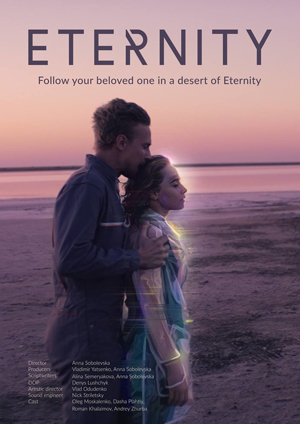 After taking a day to attend to various non-cinema matters, I came early to the last day of the Fantasia Film Festival. I had two movies I wanted to see in theatres, but first I wanted to catch up on something I’d missed when played on the big screen: the 2019 International Science Fiction Short Film Showcase. Luckily, I was able to watch it at the Fantasia screening room. Uncharacteristically, American shorts dominated this year; in an appropriately science-fictional statistic, 7 of 9 movies were from the US, with one from Australia that ended the showcase (at least in the order described in the Fantasia program) and one from Ukraine that began it.
After taking a day to attend to various non-cinema matters, I came early to the last day of the Fantasia Film Festival. I had two movies I wanted to see in theatres, but first I wanted to catch up on something I’d missed when played on the big screen: the 2019 International Science Fiction Short Film Showcase. Luckily, I was able to watch it at the Fantasia screening room. Uncharacteristically, American shorts dominated this year; in an appropriately science-fictional statistic, 7 of 9 movies were from the US, with one from Australia that ended the showcase (at least in the order described in the Fantasia program) and one from Ukraine that began it.
“Eternity,” directed by Anna Sobolevska from a script by Sobolevska and Alina Semeryakova, is an effective 23-minute tale about a future year 2058 in which dying people can upload themselves into digital worlds designed by a massive corporation. These worlds have been tested by living humans, but for some even the best are pallid copies of the real world. One way or another, nobody wants the simple afterlives provided by the state. Ian (Oleg Moskalenko) is a man who doesn’t buy into the illusions provided by the Charon Corporation. But his wife Marie (Daria Plakhtiy) is thrilled by the cyber-estate they’re offering. Then tragedy strikes, and Ian has to make a series of terrible choices, balancing the desires of both of them with his idea of integrity.
This is an extremely strong film. It looks sharp, to start with; both the grim, shadowy real world and the lushly-hued cyber-fantasies come across well. The acting’s strong, especially from Moskalenko. The story structure’s solid, getting across a complicated science-fictional idea, exploring it with both plot twists and background ideas (Charon is everywhere, it seems), and above all telling a character-centred tale.
What may be most impressive is how many themes are on display here. I read it as a story about a man struggling to hold on to his beliefs in the face of corporate pressure, trying to set aside sterile romanticism but forced into being complicit with the powers that run the world. But then there’s also a lot here about the power of capitalism, especially in opposition to what used to be viewed as transcendental values — Charon sells a simulacrum of heaven, almost but not quite the real thing. So the film’s about life, death, and what’s beyond, and how to meet all these things. And, on top everything else, it’s built around a relationship of man and wife sketched both convincingly and briefly. This is Sobolevska’s first film as both writer and director, and it’s impressive; one hopes to see more from her in future.
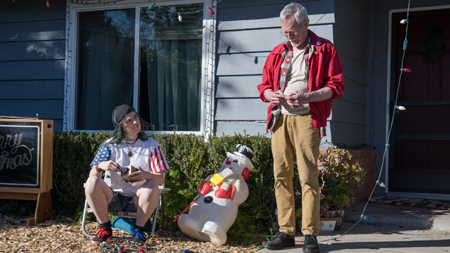 Next came “Here & Beyond,” a 17-minute piece directed by Colin West from a script he wrote with Corey Aumiller. Mac (Greg Lucey) used to be a kids’ tv-show personality, presenting science facts as part of a duo with his dead wife Ruth (Christine Kellogg-Darrin). Now his brain is degenerating. As he forges a strange friendship with cynical teen neighbour Tess (Laurel Porter), he must strip away everything from his home that reminds him of his wife, in order to minimise confusion; but does he have a way to change the flow of time?
Next came “Here & Beyond,” a 17-minute piece directed by Colin West from a script he wrote with Corey Aumiller. Mac (Greg Lucey) used to be a kids’ tv-show personality, presenting science facts as part of a duo with his dead wife Ruth (Christine Kellogg-Darrin). Now his brain is degenerating. As he forges a strange friendship with cynical teen neighbour Tess (Laurel Porter), he must strip away everything from his home that reminds him of his wife, in order to minimise confusion; but does he have a way to change the flow of time?
This is a stunningly effective film. Lucey’s excellent as a man quietly facing an inevitable end with what dignity he can, losing even the memory of the love of his life. Porter’s sullen Tess is convincing in what could have been a flat part. The movie has strong visual ideas, fusing Christmas and July 4 in a charming blend of iconography, and capturing the feel of old PBS-like science TV shows in a knowing yet unironic way. Those shows in turn comment on Mac’s situation in cheerful yet resonant dialogue. The movie ends with an effective ambiguity but (as I read it) a necessary note of hope, and it captures some of the thrill of scientific discovery along the way. Above all, it’s emotionally powerful, dealing successfully with some powerful themes. West is apparently looking to make a feature-length version, and it should be worth watching for.
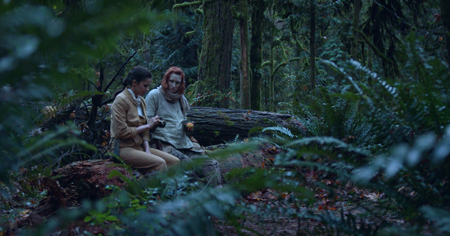 “The Slows” is a 22-minute adaptation of Gail Hareven’s short story written and directed by Nicole Perlman, her debut as director after writing the first Guardians of the Galaxy film and Captain Marvel. In a future where people do not bear children as we are used to, a special wilderness reserve holds a community who birth and rear young in the traditional biological fashion. We follow a woman (Annet Mahendru) from the outside world trying to understand them; but she herself may be stranger than we know.
“The Slows” is a 22-minute adaptation of Gail Hareven’s short story written and directed by Nicole Perlman, her debut as director after writing the first Guardians of the Galaxy film and Captain Marvel. In a future where people do not bear children as we are used to, a special wilderness reserve holds a community who birth and rear young in the traditional biological fashion. We follow a woman (Annet Mahendru) from the outside world trying to understand them; but she herself may be stranger than we know.
This is not a bad movie, but plot-wise I found nothing unexpected about it. Given the basic premise above, all the beats I’d expect to be present were, and the lead’s development follows a fairly standard path. The ending has an interesting twist, if only for what it says about the main character. It’s shot well, but the (quite fine) original story is more convincing in its presentation of the basic science-fictional idea, in its sense of the researcher’s character, and especially in its depiction of power dynamics and the researcher’s sense of cultural superiority.
“Ava In the End” was directed by Ursula Ellis from a script by Addison Heimann. As the ten-minute film opens, Ava (Elsa Gay) has just died, and has woken up inside a computer’s hard drive waiting for her mind to be downloaded into a new body. But the computer responsible for the download (Allie Gallerani) seems to have other ideas.
 It’s hard not to think of The Good Place given the way this film begins. Luckily the dialogue between Ava and the computer is witty enough to sustain the impression, though the ending’s downbeat, and so produces a different tone. The film takes place in one location, with one visible actor, and makes the idea work.
It’s hard not to think of The Good Place given the way this film begins. Luckily the dialogue between Ava and the computer is witty enough to sustain the impression, though the ending’s downbeat, and so produces a different tone. The film takes place in one location, with one visible actor, and makes the idea work.
Although the nine-minute “Five Minutes” is an American film, it plays out in Mandarin. Directed by Shange Zhang from a script by Nichole Delaura based on Zhang’s story, it’s about a grieving businessman (Zhan Wang) who gets a chance to call his recently-dead wife in the past, and talk to her for five minutes so long as he doesn’t speak about her future. It’s a solid enough piece, and it’s funny to see the futuristic telephone to the past as an old black rotary-dial phone. On the other hand, there’s a strong echo of a suspect under arrest given one phone call. I think the story’s mainly about communication and the lack of same in a relationship, though, and it is unyielding in the right places about the impossibility of change. Strong acting by Wang emphasises the caller’s emotional journey, and helps sell the tale.
 Next came one of the most frightening movies of the festival, for reasons that had nothing to do with plot. “Face Swap” was written and directed by the duo of David Gidali and Einat Tubi. In the near future, a man (Troy Caylak) has convinced his wife (Megan Gray) to go to a futuristic love hotel where holographic projectors will allow two guests to take on the images of chosen celebrities through real-time animation. He becomes George Clooney, she becomes Rachel McAdams. But there’s a twist he doesn’t expect. It’s solidly-made, with a kind of modern update on a very old low-comedy trick.
Next came one of the most frightening movies of the festival, for reasons that had nothing to do with plot. “Face Swap” was written and directed by the duo of David Gidali and Einat Tubi. In the near future, a man (Troy Caylak) has convinced his wife (Megan Gray) to go to a futuristic love hotel where holographic projectors will allow two guests to take on the images of chosen celebrities through real-time animation. He becomes George Clooney, she becomes Rachel McAdams. But there’s a twist he doesn’t expect. It’s solidly-made, with a kind of modern update on a very old low-comedy trick.
What is frightening about this movie is the technology with which it’s made. It uses deepfakes to make Caylak and Gray look like Clooney and McAdams. The filmmakers are responsible in their use of the technology. You know what you’re seeing, you know you’re not actually watching big stars in the short, and in fact the images are allowed to slip and lag as the in-story holographic projectors struggle to keep up. And for all that, there are moments when the illusion’s perfect; it’s not that you could swear that you’re watching Clooney onscreen, so much as it wouldn’t occur to you to think otherwise. The technology’s passed right through the uncanny valley and come out the other side. It works here in context because in part the film’s about the hidden pitfalls of this kind of technology, and the bad ends to which it can be put. And on a social scale it is really quite terrifying. (See for yourself.)
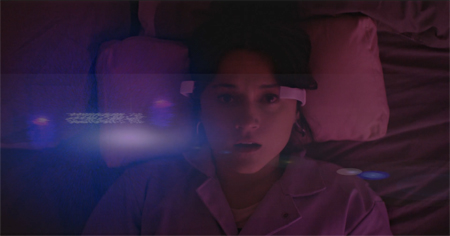 Kit Zauhar wrote and directed the 15-minute “The Terrestrials.” In the future, there is a device that allows two people to have sex without bodies, in a kind of cyberspace; it’s Tinder without matter. Lucy (Arabella Oz), a reserved scientist with an interest in the search for extraterrestrial life, has sex with a stranger named Will (Henry Fulton Winship). Then there are technical issues, and Lucy has to reach out in ways she didn’t expect. The characters have some thought behind them and the ending’s very strong, while the theme of a search for connection is echoed by the science-fictional idea of the movie.
Kit Zauhar wrote and directed the 15-minute “The Terrestrials.” In the future, there is a device that allows two people to have sex without bodies, in a kind of cyberspace; it’s Tinder without matter. Lucy (Arabella Oz), a reserved scientist with an interest in the search for extraterrestrial life, has sex with a stranger named Will (Henry Fulton Winship). Then there are technical issues, and Lucy has to reach out in ways she didn’t expect. The characters have some thought behind them and the ending’s very strong, while the theme of a search for connection is echoed by the science-fictional idea of the movie.
Brock Heasley wrote and directed “The Two Hundred Fifth,” a 19-minute film about a young girl, Maxine (Ema Horvath), who brings her friend Cat (Audrey Neal) to meet a boy, Jason (Wyatt Daniels). And then explains that Jason’s the boy she’s going to grow up to marry. She knows this because she’s a repeater, someone who lives her life over and over and over again. In shock, Cat follows her through an abruptly-escalating series of strange occurrences, as the looping nature of Maxine’s life comes to the fore.
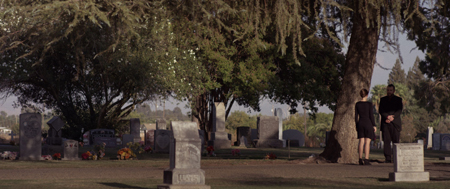 This is a clever film, with an intricate yet character-oriented reason behind its initial scene. There are some developments that threaten to send the story spinning off in weird directions; there may be too many ideas here for a single short. But Maxine’s an engaging lead, and her offhand discussions about the various people she’s met and things she’s done are lovely. (As when she mentions meeting Steven Spielberg in multiple incarnations: “Nice guy. Keeps trying to make 1941 happen.”) It moves sharply, and shifts registers smoothly to incorporate a surprising amount of violence.
This is a clever film, with an intricate yet character-oriented reason behind its initial scene. There are some developments that threaten to send the story spinning off in weird directions; there may be too many ideas here for a single short. But Maxine’s an engaging lead, and her offhand discussions about the various people she’s met and things she’s done are lovely. (As when she mentions meeting Steven Spielberg in multiple incarnations: “Nice guy. Keeps trying to make 1941 happen.”) It moves sharply, and shifts registers smoothly to incorporate a surprising amount of violence.
Finally came “Lavender,” written and directed by Henry Boffin. In the future, food shortages mean human flesh has become part of people’s diet — specifically, the flesh of those suffering from the “Hebedus virus,” a brain-eating disease. When one woman (Ellen Bailey) finds her father (John McNeill) suffering from the incurable ailment, she must resign herself to letting him go to become meat.
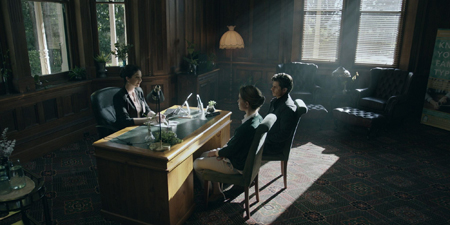 It’s a well-acted piece, but I found the two ideas (cannibalism from food shortage, and a new kind of dementia) seemed excessive in one story. The world feels like it hasn’t changed enough for widespread cannibalism to be believable — if there are food shortages so intense cannibalism becomes a logical solution there must be profound changes in society, but the movie looks much like the present day. Meanwhile, the Hebedus virus feels like a convenient way to tell a story about dementia without actually writing about a specific condition. There are a couple of good ideas here (for example, the human meat is given a code, so consumers can avoid a specific code of meat and be sure they’re not eating a member of their family) and the film’s extremely well-acted, particularly on the part of McNeill, who gets a lot across by merely staring vacantly in front of him. It’s not a bad movie, but I found it unengaging.
It’s a well-acted piece, but I found the two ideas (cannibalism from food shortage, and a new kind of dementia) seemed excessive in one story. The world feels like it hasn’t changed enough for widespread cannibalism to be believable — if there are food shortages so intense cannibalism becomes a logical solution there must be profound changes in society, but the movie looks much like the present day. Meanwhile, the Hebedus virus feels like a convenient way to tell a story about dementia without actually writing about a specific condition. There are a couple of good ideas here (for example, the human meat is given a code, so consumers can avoid a specific code of meat and be sure they’re not eating a member of their family) and the film’s extremely well-acted, particularly on the part of McNeill, who gets a lot across by merely staring vacantly in front of him. It’s not a bad movie, but I found it unengaging.
Overall, though, I thought the showcase had gathered a strong collection of films. I note the movies seemed a little longer on average than in past years, and I think that bit of extra time helped go to establishing character, the prime concern of most of these pieces. The tonal variety was appreciated, as well. In a year I feel Fantasia was marked by particularly strong short films, this block of shorts shone.
Find the rest of my Fantasia coverage from this and previous years here!
Matthew David Surridge is the author of “The Word of Azrael,” from Black Gate 14. You can buy collections of his essays on fantasy novels here and here. His Patreon, hosting a short fiction project based around the lore within a Victorian Book of Days, is here. You can find him on Facebook, or follow his Twitter account, Fell_Gard.